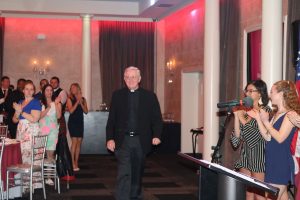Dr. Leventhal shares autism spectrum disorder research with Iona community
September 29, 2016
Iona College welcomed Dr. Bennett Leventhal to discuss his long-term research regarding Autism Spectrum Disorder (ASD) on Sept. 22.
His lecture, entitled “The Study of Autism: A Parable About Science,” discussed his many research projects, personal experiences and prompted the audience to help integrate those with ASD into society.
“I was painfully curious to discover how the brain creates social functioning,” Dr. Leventhal said.
His research consists greatly of studying both genetic and environmental components that contribute to ASD.
Leventhal and his research team were also very interested in tracking the early signs of ASD.
He referred to ASD as “a fundamental disruption in reciprocal social interaction,” meaning that many people who are diagnosed with ASD exhibit many challenges with completing basic social tasks. These tasks included but are not limited to: visual, regard, language (expressive and receptive), verbal communication (speech, prosody, and pragmatics), non-verbal communication (facial expressions and gestures), social-emotional reactivity, imitation, symbolic play (alone and with others, joint attention, theory of mind, and repetitive behaviors.
If a child seems to struggle with many of the above social functions, ASD may be a diagnosis for a medical professional to consider.
Leventhal also mentioned how a cure for ASD is not likely to be found in the near future. However, he did mention what an ideal cure for autism would include. He said that the ideal cure system would be to detect the warning signs of ASD early, help to improve communication skills, help to enforce typical behavior early on in life, and, if necessary, would include medication.
Along with the above treatment system, Leventhal said how important Best Buddies and other immersion programs are to those with ASD.
“Programs like these help those with ASD to participate, helps to make them feel a part of something greater, teaches them many skills and teaches the community about those with ASD,” Leventhal said.
Programs that work to promote friendships between those with and without disabilities work towards a society that promoted inclusion and helps those with disabilities to be more accepted and a part of society.
Many students were impacted by Leventhal’s work and his words.
“After taking biology, psychology and speech pathology courses, it was intriguing to hear about a topic that has been discussed in all those courses,” junior LeeAnn Renda said.
Dr. Bennett Leventhal is a Professor from the University of California San Francisco. He is also the Deputy Director and Director of Training for the University’s Department of Child and Adolescent Psychiatry.







